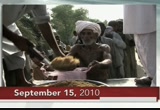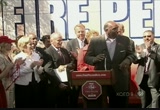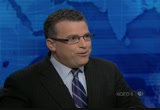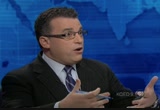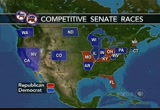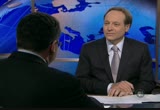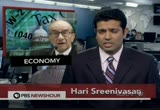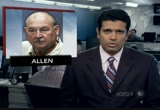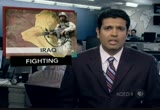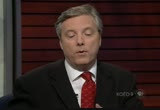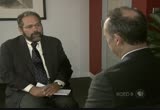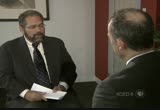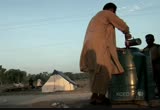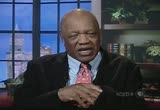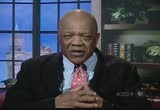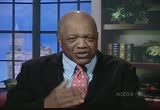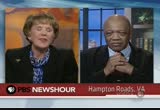tv PBS News Hour PBS September 15, 2010 6:00pm-7:00pm PDT
6:00 pm
captioning sponsored by macneil/lehrer productions >> ifill: good evening. i'm gwen ifill. outsiders and tea-party backed candidates posted victories in key primaries around the country yesterday. >> brown: and i'm jeffrey brown. on the newshour tonight. our political editor david chalian reviews the winners and losers. >> ifill: then, a roundtable of political strategists explains what the results mean for republicans, for democrats and how they will affect who controls congress. >> brown: ray suarez talks to mexican ambassador arturo sarukhan as his country celebrates its bicentennial and fights an all-out war against drug-trafficking. >> as mexico seeks to shut down the flow of drugs moving north, the united states needs to step
6:01 pm
up to the plate and shut down the flow of weapons and cache moving >> ifill: plus, jose luis sierra of new america media reports on how the drug war has affected the tourism and manufacturing industries in the mexican state of baja california. >> we want to get back to getting people to think about mexico as fun in the sun and margaritaville and those types of things and stop associating mexico with blood and violence. >> brown: global post's suzanna koster reports from pakistan on an islamic charity providing aid to flood victims in the absence of government help. >> ifill: and margaret warner speaks to veteran journalist earl caldwell about famed civil rights era photographer and newly revealed fbi informant ernest withers. >> ifill: that's all ahead on tonight's "newshour." major funding for the pbs newshour has been provided by:
6:02 pm
>> feels like. >> from deep space. >> to a microbe. >> i can contribute to the world by pursuing my passion for science. >> it really is the key to the future. >> i want to design... >> a better solar cell. >> i want to know what's really possible. >> i want to be the first to cure cancer. >> people don't really understand why things work. >> i want to be that person that finds out why. >> innovative young minds taking on tomorrow's toughest challenges.
6:03 pm
and by the alfred p. sloan foundation. supporting science, technology, and improved economic performance and financial literacy in the 21st century. and with the ongoing support of these institutions and foundations. and... this program was made possible by the corporation for public broadcasting. and by contributions to your pbs station from viewers like you. thank you. >> brown: tuesday's primary elections ended with another night of surprises in a year of upsets. and it left the political world to sort out what it means for the republican party's quest to take back control of congress. ( cheers and applause ) another primary, another victory for a relative unknown over a more established candidate. this one came in delaware, with christine o'donnell's win in yesterday's republican senate
6:04 pm
primary vote. >> ladies and gentlemen, the people of delaware have spoken. ( cheers and applause ) >> brown: o'donnell, a tea party favorite, won 53% of the vote, defeating the national party's preferred choice-- moderate nine-term congressman, mike castle. >> the common-sense men and women of delaware are tired of this same old coming out of washington. they don't want more of the same. well, we are not more of the same. ( laughter ) so hold on to your hats, folks, because we're in for a fight. >> brown: castle becomes the eighth republican candidate favored by the party to be overtaken in a senate bid in the past year and a-half. he did not endorse o'donnell in his remarks last night, and an aide to castle said today no such support would be coming. >> and the voters in the republican primary have spoken, and i respect that decision. >> brown: the national republican party, which had fiercely supported castle, now must grapple with o'donnell's candidacy in the november election.
6:05 pm
in an interview with abc this morning, o'donnell said she doesn't need the party establishment. >> i believe that we can win without them. this is about giving the political power back to we, the people. i didn't count on the establishment to win the primary. i'm not counting on them to win the general. i'm counting on the voters of delaware. >> brown: those voters will now choose between o'donnell and chris coons, who ran unopposed in the democratic primary. o'donnell's victory produced decidedly different reactions in washington today. republican national committee chairman michael steele said o'donnell would have his full support and he praised the movement that spurred her victory. >> this is coming from the streets of america, this is coming from small towns, this is coming from neighborhoods wide and large. and the establishment in this town is so clueless and so out of touch with what real people are going through every day. >> brown: at the white house, press secretary robert gibbs played up the criticism of o'donnell from her fellow republicans.
6:06 pm
>> i think if you look at what people like karl rove or people like the state g.o.p. chairman have said, the republicans in delaware nominated somebody that they don't believe can win, i think, in the words of the state party chair, couldn't be elected dogcatcher. >> brown: in new hampshire's republican senate primary, meanwhile, a party favorite did manage to pull out a narrow victory. as kelly ayotte was declared the winner today over conservative insurgent ovide lamontagne. she'll now face democratic congressman paul hodes in november. the tea party found additional success in new york, though, where carl paladino received 62% of the vote in the republican gubernatorial primary to defeat rick lazio. >> if we've learned anything tonight, it's that new yorkers are as mad as hell. ( cheers ) >> brown: paladino's general election opponent will be democratic state attorney general andrew cuomo, the son of
6:07 pm
former new york governor mario cuomo. also yesterday, 20-term congressman charles rangel vanquished five opponents to take the democratic primary in new york's 15th district, despite facing an upcoming house ethics trial. >> no matter what they say, i go back to washington stronger than i've ever been. ( cheers ) and it has nothing to do with my >> brown: and in washington, d.c., mayor adrian fenty-- who four years ago swept into office as the city's youngest ever mayor-- lost to city council chairman vincent gray. >> to those who say you can't have both collaboration and reform, that they are mutually exclusive, i say you are wrong! >> brown: as an extraordinarily volatile primary season comes to an end. the candidates will now prepare for what may be an even rockier general election campaign. >> brown: and joining me now is "newshour" political editor david chalian. welcome back. >> thank you.
6:08 pm
>> brown: another outsider victory. this time the focus for the at a today is on the republican party, right? >> no doubt, jeff. we've seen all primary season long,ed in the republican party, this storyline play out. what's amazing is primary season ended quite with a bang because of where it took place, but we've seen this tea party element, the conservative engilessed element in the republican party, upend the establishment time after timed after time. the victory for christine o'donnell in delaware is the eighth time this year that the preferred republican candidate fell to an insurgent candidate inside these republican primaries grown so fill in the picture a little bit with her and the state. who is christine o'donnell? what factors-- what do we know about what got her to victory? >> she's not brand new to delaware politics. meant people don't realize, she was actually the republican nominee once before, two years ago, against joe biden. of course winning the republican nominee against joe biden, she only got about 35% of the vote
6:09 pm
and she spent about $100,000. >> brown: but she's known within the state. >> she's known within the state as a bit of a gadfly. she's a marketing business person there and political commentator over her life, and social conservative but embraced by the tea party movement this time around. she went out very early on and sought to enmesh herself in the tea party movement. sarah palin endorsed her, and the tea party express, one of the groups in this sort of difiews movement went on the air if television ads for her, so she had the full backing of the right-wing of the party. >> brown: so the key question is how this impacts the battle for control of the senate. >> without a doubt. and that's why delaware was a little bit different. in other places like kentucky or colorado or nevada where we saw the tea party candidate win the republican nominations, those are states where they could still perform rather well.
6:10 pm
in delaware, which is a democratic-leaning state, it makes it much tougher. take a look here at the map fucialg. this is the coom pettative senate race landscape. obviously you see many more blue states currently held by democrats because they're playing a lot more defense. they have to defend a lot more turf than the republicans do. >> brown: these are the ones up for grabs. >> these are the ones that are competitive right now. you can immediately see, if the republicans hold all the red states, they're already leading in about three of the blue state, north dakota, indiana, and arkansas. that means they have to win seven of the nine left in order to get the 10 that they need to become the majority party. that was easier when the universe included delaware because it look liked with mass mass as the nominee that would be an easy pickup for them. that just became a lot harder. >> brown: the assumption is she is a weaker candidate than mike castle would have been. we heard democrats playing thatip today, right, playing up the differences between-- within the republican party. >> right.
6:11 pm
and it's not just democrats that thought she was the weaker candidate. the republican establishment thought she was the weaker candidate as well. but here's where democrats may want to not uncork the champagne just yet because what fueled her candidacy, this energy, is what we're seeing that is dominating the political environment. last week, there was a study out from the american university looking at voter turnout. for the first time since 1930, there's been a greater republican turnout in the statewide primaries than there is on the democratic side. all the energy, all the enthusiasm, and all the activism is on the republican side, and primary season is over, jeff, "now, so all of this that took place between the tea party and the establishment republican party during primary season, that energy now turns for the next seven weeks on to the democratic party with the sole goal of trying to knock them from majority status to minority status. >> brown: but for today-- and i saw you smiling as it happened-- we got to see robert gibbses quoting karl rove which you don't see too often.
6:12 pm
>> you don't see that too often. >> brown: david chalian >> ifill: coming up, we'll have more analysis of yesterday's results. that will be followed by two takes on mexico; the ambassador on the drug wars and the decline in tourism on the baja peninsula. plus, pakistan's militants providing flood relief, and a civil rights photographer's links to the fbi. but first, with the other news of the day. here's hari sreenivasan in our newsroom. >> sreenivasan: the former chairman of the federal reserve alan greenspan weighed in today against keeping the bush-era tax cuts alive. he said the country cannot afford them at a time of trillion-dollar deficits. he called for letting the tax cuts expire at the end of the year, and for cutting federal spending. on wall street, stocks moved higher after news that industrial output rose last month for the 12th time in 14 months. the dow jones industrial average gained 46 points to close above 10,572. the nasdaq rose 11 points to close at 2,301. tropical storm karl hit a thinly populated section of mexico's yucatan peninsula today with winds of 65 miles an hour.
6:13 pm
the storm was on track to cross into the gulf of mexico tomorrow and then hit mexico again on saturday, possibly at hurricane strength. images from the space station showed two far more powerful storms-- igor and julia-- far out in the atlantic. neither posed any immediate threat to land. that blown-out b.p. oil well in the gulf should be killed for good by sunday, five months after the oil spill disaster began. the government's point person thad allen said today a relief well should be completed within 24 hours, allowing crews to pump in mud and cement from below. the top of the well was sealed earlier. also today, the interior department announced oil companies will have to seal nearly 3,500 in-active wells in the gulf. the latest middle east peace talks ended today in jerusalem on a day marked by attacks in both israel and gaza. israeli jets bombed a smuggling tunnel along the gaza border with egypt, after militants fired mortars and a rocket into israel. at the talks, secretary of state hillary clinton met again with israeli prime minister benjamin netanyahu and palestinian
6:14 pm
president mahmoud abbas. >> they are getting down to business, and they have began to grapple with the core issues that can only be resolved through face to face negotiations. i believe they are serious about reaching an agreement that results in two states living side by side in peace and security. >> sreenivasan: the u.s. has set a one-year target for getting a framework peace agreement. u.s. troops joined iraqi forces today, in a raid in fallujah, the former insurgent stronghold. they were searching for a senior al-qaeda operative. it was unclear if he was one of the six people killed. earlier this week, american units fought in a two-day battle with al-qaeda militants. u.s. forces officially ended their combat role on september first, but they can still take part in operations, if the iraqis ask for help. in afghanistan, police fired into the air to disperse hundreds of protesters just outside kabul. at least one person was killed and 45 others wounded. the protesters were
6:15 pm
demonstrating against scattered burnings of the koran in the u-s last weekend. most of the injuries came from ricocheting bullets. police said the taliban are using the rallies to incite violence, ahead of next week's elections. lawmakers in france voted today to raise the retirement age to 62 to stem losses in the pension system. the national assembly, the lower house of the french parliament, approved sweeping retirement reforms after a contentious overnight debate. outside, several thousand people protested, demanding the bill be withdrawn. france's current retirement age is 60, one of the youngest in the european union. president nicolas sarkozy's plan now goes to the french senate for debate. those are some of the day's major stories. now, back to gwen. >> ifill: we take closer look at yesterday's twists and turns with three strategists who follow them for a living: republican kevin madden, democrat steve mcmahon and matt kibbe, president of the conservative advocacy group freedomworks and co-author of a book on tea party politics. i have to start by asking you, can kevin madden, what happened last night?
6:16 pm
>> look, i think what you saw was a very-- an electorate that is very animated around sending a message to the establishment, that they are-- they were basically sending a message to washington that they weren't going to send the same people back to washington career politicians. at the same time, you're looking at an electorate that is very animated, very mobilized around issues like spending and deficit. right now the american public is so anxious and angry at what they see out of washington-- more spending, pile up deficits, growing the size of government-- at the time of a sluggish economy. >> ifill: have main stream republicans been caught off guard? >> i think we are looking at an electorate that is sending a message and it's taking us a lot longer than it should have to get it. >> ifill: how about you, matt kibbe. >> what happened thissed it is what's been happening all along and it has been a message from the american people, from all the activists that are animated to these fiscal issues that it's
6:17 pm
not good enough just to be a republican. you have to actually have a record and a credible record on these fiscal issues. >> ifill: but we have seen this, and up until now we've striebd the tea party as the so-called tea party or as this group that doesn't really have a leader. today it's got actually a form and a function. >> it is. and the establishment doesn't quite get the power of this organic networked community that has come out on these ideas, and it's no longer about name idea. it's not about how much money you have in the bank. it's whether or not you can connect with this community and turn out the vote. so hard work and principle is defining this election cycle . >> ifill: steve mcmahon, it's usually the democrats having these kind of problems at this stage in the campaign. what did you see happening last night? >> it's a problem for the democrats that there's all this energy on the right but it's also an opportunity. one of the things that happens is when you have so much energy on the right side of the party is they tend to leave the middle
6:18 pm
behind and that is happening in at least delaware, for sure, where the nominee now trails the democrat by 16 points, according it a recent poll. if mike castle had been the nominee, he'd have a double-digit lead over the democrat. so you saw a swing of 26 points in that race alone. you see in nevad aharry reid would have been the most vulnerable senator in the united states senate, perhaps, but he drew a tea party candidate, so neez a race that is a dead heat and democrats have a great shot there. in kentucky the same thing. and in alaska, lisa murkowski, who was defeated by a tea party candidate may pull a job lieberman and run as an independent which i think puts that race back in play for democrats are too. it cuts both ways. there's energy on the right, but in going so far right, the republicans run the risk that they leave the middle behind and create opportunities for democrats. >> i think the issues, though, that are mobilizing voters across the political spectrum right now are not right-left. i think what you're looking at is a--ab electorate that is very
6:19 pm
worried about the the growth of government. they're very worried about spending, and they see deficits piling up in washington. right now, the middle-- >> ifill: excuse me, a they blame a lot of the republicans and democrats who currently in washington. >> correct. and i think the middle right now is as closely aligned with tea party sentiments. and i don't think that-- i think what happens is a big problem for democrats right now is they're deriding these folks at their own peril. i think that it's a big-- >> i think it becomes-- >> they're not deriding them. >> it looks a tener when you say these are extreme issues. it is not extreme to say washington is spending too much money and piling up deficits. >> ifill: let me tell you who is deriding these information, karl rove, who basically said last night at our own peril as a party do we embrace these candidates who you basically said are less credible. what do you do? does that help you, and, frankly, when someone of karl rove's stature.
6:20 pm
>> we don't call the movement. we don't take our direction guys like karl rove and the republican national committee and these folks have gone right around the establishment, not just the republican party, but the democratic party as well. so you've got to look at this more in a global picture. and i would challenge you on the idea that somehow candidates like sharob engel and rand paul are out of the mainstream. the idea the government shouldn't spend money it doesn't have. the idea government can't and shouldn't take over our health care system-- that's where the independent voter it is today. that's the very center of politics. i believe the tea party is shaking up politics but it's a very healthy thing. >> ifill: today we saw michael steele and john cornyn start to make nice sounds about the tea party. >> here's the point i was trying to make. i'm not trying to deride or run
6:21 pm
down the voters in the tea party movement because i think you're right. many independent voters are very concerned about the size of government are the amount of money being spent, and they're voting on that basis. what they tonight always appreciate or understand are some of the underlying positions some of these candidacy. for instance, many of these tea party candidates think social security is unconstitutional and should be repealed. at least one of them has suggested the civil rights act was unconstitutional. so the independent voters who think social security is a good idea, who think medicare is a good idea, who think the civil rights act is a good idea, are people who, frankly, don't understand the depth of a lot of these positions. the tea party folks run on things that are very popular-- smaller government, limited government, lower taxes -- things that, frankly, democrats, republicans, and independents, many of them favor. but it's the other things that make them extreme, not the-- not the sort of mainstream things that they talk about every single day which sounds so-- >> but the voters care about some simple facts.
6:22 pm
$13 patrol in debt. 10% unemployment, spending that is out of control, and no sense from the washington establishment that they're willing to do anything about these problems. so they're looking for people that are going to do something. >> ifill: let me ask a question, david chalian mentioned jim demint, the happiest guy in washington today, who endorsed all of these tea party candidates who won. she was speaking to john carl at cbs news and said frankly i'd rather lose fighting for the right cause than win fighting for the wrong cause. is that a problem for republicans? >> i think we have to look at what the art of the possible is and if we are going to try to reduce the size of government and stop the growth of government with the health care and other parts of the big democrat agenda, then we have to-- it helps if we have a majority. it helps if we have a number of votes. there are simply some states where it is a challenge for somebody like christine o'donnell in delaware to win that particular state, given her particular public profile and given the state's public profile.
6:23 pm
>> ifill: other examples besides delaware? >> >> well, i think there are other states-- look, we have candidates that can win in place like washington and places like wisconsin, because they've adequately managed their profile with those particular voters on the big issues of the day. and that's why we're going to be particularly successful there. i think what we have to look at is where can we win? if we're going to build a majority in the united states senate, let's try and develop some candidates that can win in some of these states. now, i think there is still a chance that christine o'donnell could win. i think there are a number of people who said there's no chance she can even win the primary and those people were proven wrong last night. it still remains to be seen. there is a little bit of a battle right now in the republican party, more about the pragmatists and the purists, and there are pragmatists who think we have to get candidates that fit the unique profile of some of these states. >> ifill: does the battle in the republican party purify tmake it a better party or stronger party or does it implode the party?
6:24 pm
>> i think it makes it stronger if it focuses on issues that matter, and then follows through by actually implementing good public policy. keep in mind, there's been this big shake-up in the republican primaries and that story is about winding down, and the next target is november 2, and the democrats voted for government-run health care system, who voted for a trillion dollars in unfunded stimulus member. you look at states like connecticut, california, washington, wi wisconsin-- these states aren't looking quite so blue anymore. they're looking purpile and some are looking downright red. >> listen to them chuck lin. >> they're having a great time, aren't they. >> ifill: that is the fear, the mainstream republicans, the tea party republicans realize it's better if they join forces and take out the big, bad blue democrats will in the fall. that doesn't give you even another 24 hours to giggle about last night. what do you do? >> i mean, i think what you do
6:25 pm
is recognize, and i think one of the things republicans are losing sight of and kevin alluded to, one of the reasons the republican establishment preferredly the candidates that they preferred is because they had a profile that the establishment, based on polling and research, believe fit the electorate. and believe-- not the primary electorate, which is different than the general election electorate. one of the things that people forget sometimes when they watch these primaries is independent voters decide general elections. the reason barack obama won nine states that george bush had won previously is because independent voters voted two to one for democrats. >> ifill: and the reason barack obama's poll numbers are so bad-- >> the independent voters are started to leave barack obama and the democrats. the question is when you nominate tea party candidates who are so-- i say extreme not as a prejorrative, but if you want to repeal social security, if you think the civil rights act is unconstitutional, if you want to take away medicare, most people think that's extreme. those are the positions that will get independent voters back in line for democrats. so i actually think that as much
6:26 pm
as-- as much as, you know, people say this is really bad news for incumbents, it's actually not bad news for the incumbents that these tea party candidates are running against because they look more moderate and they look less extreme in comparison to some of like susan engel who thinks social security and medicare shouldn't exist or rand paul who thinks the civil rights act is unconstitutional. >> ifill: i get the feeling this is going to twist and turn in a few more directions between - ack, matt kibbe, kevin madden, thank you very much. >> brown: and we turn to a two-part look at mexico on a troubled anniversary. tonight, mexicans begin several days of parades and street festivals to mark the 200th year of their independence from spain. ray suarez begins our coverage. as mexicans are observing the three-day holiday, their country is fighting a vicious drug war. violence between the mexican government and the drug lords--
6:27 pm
and among the cartels themselves -- surged after president calderon deployed 45,000 army troops and federal police to fight the drug trade in 2006. since then, at least 28,000 people have been killed in the fighting. last week, u.s. secretary of state hillary clinton likened the violence to an insurgency, the strongest language yet from the u.s. government. >> we face an increasing threat from a well-organized network, drug-trafficking threat that is, in some cases, morphing into or making common cause with what we would consider an insurgency, in mexico and in central america. it's looking more and more like colombia looked 20 years ago. >> suarez: at the height of colombian violence in the 1980s and 1990s, rival guerrilla armies and drug gangs killed political figures and civilians. the u.s. has poured billions of
6:28 pm
dollars into the military effort to quell the violence there. mexico is also struggling to recover from its worst economic recession since the 1930s. tourism, a major driver of the mexican economy, dropped off first because of last year's outbreak of swine flu, and then because of the mounting drug violence. those problems were high on the agenda when i spoke to the mexican ambassador to the united states, arturo sarukhan, yesterday. mr. ambassador, welcome back to the "newshour." >> it's a pleasure to be with you, ray. >> suarez: you know, birthdays are... we associate them as a time for celebration and good cheer. is this a happy birthday for mexico, a country really in crisis, it's not paying attention to this momentous day? >> i think that the circumstances which mexico faces, this year in particular, certainly aren't peachy and rosy, simply because the challenges that we face whether it's picking the economy up from
6:29 pm
the bootstraps as a result of last year's huge recession which hit all of us very hard, but mexico's recovering very nicely. whether it's the issue of the fight against organized crime, how do you take on transnational organized crime plying its trade on both sides of the border, there are important challenges. but this should not subtract, ray, to the very important fact of where mexico has come in these 200 years of independent history. i don't have to go even back 200 years, look at this country 20 years ago. there's been a huge political, social, cultural changes taking foot in mexico, which is making mexico extremely diverse, a country, a maturing democracy. certainly everything isn't linear. there are some issues, political debates, political decisions, policy debates which do frame a context of a profound discussion of what mexico needs to look like, and how to get there. but i think that despite the challenges that mexico faces, i
6:30 pm
think that the mood should be celebratory simply because of what mexico's achieved. the amazing richness of its culture, history, its traditions and most importantly the resilience of its civil society and how mature the civil society has become in the last 20 or 30 years. >> suarez: but can people set aside a today that is very >> suarez: on the occasion of the 100th anniversary of the mexican revolution, the 200th anniversary of the struggle for independence, there are mexican troops in the streets of major cities. is this a country that's getting a grip on its problems, as we mark this 200th birthday, can you say that you've turned a corner? >> they are there because they've been mandated by the president, by the government, as a stop-gap measure to take on organized crime.
6:31 pm
the united states for good reason has opposed the posse comitatus, which prevents the armed forces from being put into law enforcement roles for a very powerful reason. armed forces are not trained to do law enforcement issues, the same way as the mexican armed forces are not trained to do law enforcement issues. but it is clear given where we were in the fight against organized crime, the degree of penetration that organized crime had achieved, especially at the state and local level with the municipal police forces, the only instrument that we had available to push back and create the breathing space were socio-economic programs, where strengthening the judiciary could flower was by using the army to push back. so one of the distinguishing facets of mexico is we celebrate with other latin american countries this year, our bicentennial of independence-- is that mexico is one of the very, very few countries in latin america that never saw a military coup since the revolution in 1910.
6:32 pm
>> suarez: during the past week, u.s. secretary of state hillary clinton compared mexico's current problems to those of colombia at the height of its internal civil war over drug dealing. is it an apt comparison, does it capture the degree of challenge to your state and its future? >> the secretary has been undoubtedly the driving force behind the vision that we have established with the u.s. administration as to how we deepen this bilateral relationship, and how we work together in the fight against drugs. she stated very clearly - and she's done so in the past - how these two countries, mexico and the united states, need to work responsibly. as mexico seeks to down the flow of drugs moving north, the united states needs to step up to the plate and shut down the flow of weapons and cash moving south. so she fundamentally understands this important challenge. the issue of what makes colombia
6:33 pm
and mexico similar or dissimilar is an ongoing debate. i think both countries certainly face the challenge of how do you create, and enhance, the rule of law. i think colombia 20 years ago, mexico today, are facing the same challenge. how do you push back and how do you ensure the empire of liberty and the rule of law? now, there are certainly differences. in colombia, you had, and you still have, a three pronged challenge to the state: organized crime, insurgencies, groups that are determined to topple the government, whether it's e.l.n. or the farc, and paramilitary groups. mexico has none of this. what we have in mexico is very sophisticated, very brutal organized crime. we don't have that similar challenge that colombia faced, and has been facing for now several decades.
6:34 pm
>> suarez: have these problems inside mexico pushed the bilateral relationship between mexico and the united states in uncomfortable directions? are there tensions now between the two countries that no one was anticipating? >> look, this relationship by virtue of the 3,000 km that we share will never be 24/7 peachy and rosy. the challenges that both countries face, the 3000 km that we share, there are probably only two countries on the face of the earth that have the complex challenge of what we call intermestic policy, that is where domestic policy and foreign policy become one. where to move the foreign policy agenda, you have to take on the domestic constituencies in both countries, and where domestic policy in one, is foreign policy for the other, or vis a versa. and that's the case with mexico, certainly. but having said that, i don't think that we have seen such engagement by a u.s. administration and the mexican
6:35 pm
government in understanding the road map that we have to draft, how we develop a more strategic partnership than the one that we have today. does that mean everything is okay, and there are no problems? and there are no glitches in the visions we're designing? of course not. >> suarez: these decades of high levels of immigration, both legal and illegal, have created something new in the united states and that is mexican communities not just in the places that they've always been in los angeles, dallas, and san antonio and places like that but in new york, washington state and chicago is there something new and different for mexico about this large, now newly prosperous and politically engaged mexican, and mexican- american population in the united states? >> i think there is, and it's a for many, many years, and i still remember when i was a
6:36 pm
diplomatic tadpole here at the embassy in the 1990s when we were negotiating nafta, there was this sort of perception in mexico that somehow the latino community, the hispanic community in the united states should be a natural ally of the mexican government in lobbying for nafta. and many people did not understand in mexico that "a" the latino community is not homogeneous in the united states, and "b" that they don't necessarily reflect the agenda of the mexican government. and so there's been a very important change that has occurred over the last 10-15 years, in which mexico and mexicans understand that the name of the game is different. it's how we can work with those communities in the united states to enhance their integration into the fabric of american society; how we can help empower them culturally, socially, economically. how can we be a force for good in how that community interacts with a country that is their home today. so instead of asking what can you do for me, there's been a
6:37 pm
lot of how can we help you. >> suarez: ambassador sarukhan, thanks for joining us. >> thank you, ray. >> ifill: for a closer look at how one town is coping with the one-two punch of a recession and a drug war. we go to the mexican state of baja california. the reporter is jose luis sierra of new america media. >> reporter: for decades, americans have flocked to the beaches of baja california, mexico. but now mexico's drug war has hurt the important tourism industry. >> it's all the things that you hear, all the negativity, the gangs and the violence. >> reporter: this is linda lopez's first trip to mexico in years. she came reluctantly just to see her family. >> we haven't come in a while because of the fear factor and what people say about tijuana the drug cartels, the shooting, and because of that.
6:38 pm
>> reporter: hugo torres is the mayor of rosarito beach and the owner of its biggest hotel. >> we were having over a million visitors, over a million and half and during the good times of the tourist activity. and they are down below that, probably 60% to 70% in the last two years. >> reporter: in 2008, the city was struck by a wave of murders. there were also charges of police corruption and collaboration with drug traffickers. since then, about half of the police force has been sacked and replaced. a special tourism unit was trained in the u.s. to help visitors feel more secure. >> we try to make things safer edgar morales is one of the new officers he represents a new corruption-free face. >> when i first got into the force, there were stories about corruption and things like that. but now it is totally different.
6:39 pm
we have new people, we have young people. so it is definitely a different atmosphere. >> reporter: there is also a strong federal military force in baja. soldiers man roadblocks and check cars for drugs and weapons. there have been only nine homicides in resorita beach this year. but tourism is still down. that means fewer jobs and lower wages. >> the last three years, the economy has really fallen here. a lot of the people who worked in hotels, are looking for jobs in factories, they're going to tijuana or other places. >> reporter: drug violence is just one problem. the global recession also killed the real estate market. today half-built condo towers and housing developments dot the coast. they were planned for american buyers. >> we had 200 developments that were planed to be built along
6:40 pm
the coastline that were submitting permits to be built. but since then, all the pre- construction has been stopped. >> reporter: americans kanoa billondillo and his father, david started a real estate company when the market was hot. now they've had to lay off employees. >> we originally built out our office space to support 30 to 60 agents. and currently we are running around 10, 6 to 10. so that's basically what the marketing is supporting right now. >> are you optimistic about it? >> we are celebrating getting by right now. so, for us, getting by is a celebration. >> reporter: the global recession has also hit mexico's manufacturing industry, including foreign owned plants. >> i have been here for 15 years with the company and its been the worst year that we've ever experienced. >> reporter: jorge bustamante is the president of plantronics, mexico.
6:41 pm
it assembles electronic headsets. he says his company has cut production which hurts income and workers. >> a lot of companies during the economic crisis that we have had to do important adjustment, some as low as a 5% reduction, others as much as 20% reduction. it goes from production, to revenue to people. it varies depending on the type of industries. >> reporter: others here say none of the country's social and economic problems can be helped as long as so much money is being spent on the drug war. alejandro luken is a federal legislator in the opposition party. >> obviously those dollars will be taken from education, social programs, economic growth. i think there is very little incentive for change.
6:42 pm
>> reporter: the real estate developer says change will only will come when mexico can restore its image as a safe place >> we love mexico. and we want to get back to people thinking of mexico as fun in the sun and margaritaville. and those kinds of things. and stop associating mexico with blood and violence. >> reporter: but with mexican cities filled with police and soldiers, that may not happen soon. >> brown: next, an update on the pakistan floods. special envoy richard holbrooke visited a relief camp in southern pakistan today, highlighting u.s. relief contributions. his tour came as militant groups are also stepping into the aid effort. we get more on that now from the punjab in central pakistan. the reporter is suzanna koster of the international web site, "global post."
6:43 pm
>> reporter: humanitarian efforts are in full swing on the outskirts of the town of leya, southwest of intbd. it was hit hard by the massive flooding and dozens of relief work version come to provide food and medicine. but most rbt from an international aide group or the pack taken government. they are from a hard-line islamic charity . a senior representative of the group... >> ( translated ): i came two days later but our local people started working from the first day. the first day we didn't have this tent. we were assessing. >> reporter: on the other side of the road, the medical team gets ready. >> ( translated ): this spoat is ours. we sit here, some of us have breakfast here, and we plan and hold meetings here.
6:44 pm
>> reporter: falah has strong links to a group blamed for the 2008 terrorist attacks in mumbai that killed over 160 people. the charity division was shut down by the pakistani government but still aappears to be alive and well and running under the banner of rahman's organization. >> andy: >rahman's. >> ( translated ): they were our main donor during the disaster. they gave us most of the needed material and gave truckloads of full of rice and sugar. we got a lot of support from other people. >> reporter: they are here doing more than providing relief. they're also preaching. >> ( translated ): do you know with what hand you should eat? put up your hand. it's your right hand. and what do you say observer you start? "in the name of god."
6:45 pm
>> reporter: falah is capitalizing on the fact it can provide flood relief to the pakistani government can't. in just this area alone, more than 300,000 people were affected by the flooding in august. many lacked clean drinking water, food, and shelter. the devastation can be seen everywhere. this used to be a road through sugar cane fields. >> ( translated ): the water did not let us take our things. the houses started crumbling down. we quickly took our kids and a commof animals, although we lost most of them. we saved our lives and came he here. >> reporter: through robust relief efforts, falah has been able to provide loyalty. >> these people reached my village and i see these are the people there working actually. really, i'm astonished by the work of these people.
6:46 pm
for this reason, i join these people. >> reporter: a retired pack taken army general says groups like falah and its predecessor used disaster relief as a recruiting method. >> they have a grass-root network which operates in several parts of the country. and so always actually, you find them, you know, the first ones, because the government takes much longer to respond. and as it is, this government has never been very efficient. >> i would say that basically it's th one or two others which have always been trying to assist or in the forefront whenever anything like this happens. >> reporter: and so rahman and his men preach on. trantranall misery a man meets in his life is because of his own deedz.
6:47 pm
he is responsible. god says if you receive something good, it is mine. if you lose out, it is your own fault. because we believe in this, we advise everyone to become good followers of god. >> reporter: it is a message turning locals into believers. >> ( translated ): we know the work of this organization for a long time. they take the pain and suffering of others as if it is their own. >> reporter: meanwhile, some three million flood victims have yet to receive aid, and international donor funds have nearly come to a standstill according to the united nations. to address the crisis, pakistan's prime minister announced he will hold an international donor occurrence shortly. it's something that might help the government itself fill the aid gap instead of terrorist-linked charity groups.
6:48 pm
>> ifill: finally tonight, a famed civil rights photographer who appears to have also done double duty for the fbi. margaret warner has the story. >> warner: a free-lance photographer for the black press in the 1950s and '60s, ernest withers chronicled landmark moments in the battle for civil rights. he covered the 1955 murder of emmett till, the bus boycotts, and protests like the 1968 sanitation workers strike in memphis. he was treated like an insider, and given intimate access to movement leaders like dr. martin luther king. but this week, the memphis commercial appeal reported that withers also worked as an fbi informant most probably paid from at least 1968 to 1970. for more, we turn to earl caldwell. he reported on the civil rights struggle for the "new york times" and knew withers. he's now a professor at hampton university's scripps howard school of journalism. mr. caldwell, welcome.
6:49 pm
give us first a sense of ernest withers, and how important his work was to this country's understanding of the civil rights movement. >> his work was hugely important because he brought back the pictures. , you know, you can have a thousand words, but it's the pictures, and he had access. he was on the inside. so he was able to show america things that you couldn't tell america. but he had those-- he had so many. and he cataloged everything. so i think his work was hugely important. >> warner: now, you said yesterday that you were stunned when you heard the news of what the commercial appeal was reporting. why was that? was it hard to reconcile that with the man you knew? >> well, because he was a journalist, and the black journalists had made this commitment to the black community that we weren't going to be spies. we weren't going to be eavesdropping for law enforcement, that we were going
6:50 pm
to be true to what we said. and i was taken aback because he had-- his record comes out that he was doing it in such a massive way. >> warner: did he ever saying anything to you that indicated that this might have been going on? >> actually, in our conversations, it was exactly the opposite. we were like-- you know, in this together. we were colleagues. i had no idea, although i was very much aware that the pressure was to be an informant has been-- it was very intense, particularly about-- on people such as ernest who was moving through all of these various channels and had this tremendous access. >> warner: when you say "pressure" what do you mean, pressure from the f.b.i.? >> frsh the pressure from the f.b.i. my own case, the f.b.i. hounded
6:51 pm
me, hounded me about being an informant on the black panthers, which was the subject of my reporting at that time for the "new york times." >> warner: and how would they go about it? >> well, they call you on the phone and they start off by saying, "listen, all we want you to do is just, you know, what people are saying --" they make it seem like it's so innocent, that it's really nothing, that you're not really spying. you're helping us out, and that they're on your side and make it very engaging. and if you don't have that line there that says, "no, that's not what i do," you can get roped in. >> warner: now, the records that the newspapers knot ahold of show nothing about his motives whatsoever. there is something in the articles about he was under some financial pressure. he had also been a cop in the past. was the f.b.i. good at honing in on any potential point of vulnerability like that? >> that he was-- see, this is the thing.
6:52 pm
they wanted everything. so they were-- they were always asking everybody-- you can do this. and they made it like it was an act of patriotism, can the you're serving your country. we need you." and it was so harmless-- "you can do this." and ernest did have the background piece of being a police officer . >> warner: put on your journalist professor's hat and if you are talking to young people about this, how would you want them to look at it? i mean, is thia betrayal of his ethics as a journalist? is it a betrayal of the african american, who actually embraced the goals of the civil rights movement? >> i automobile it's all of those things but let me speakaise journalist. to me this is a very serious and special trust. it's a mond you make with the public. people have to believe you. they have to believe that you are who
6:53 pm
you say you are and that is your own purpose in serving the public. we as journalists, we say we represent the public. you can't represent the police department and all of these investigative agencies at the same time. you're either one or you're the other. and the sad part of this thing with ernset of, a lot of reporters now will suffer because when they go and present their credentials, people will say, "how do we know?" >> warner: and yet in memphis next month, there's going to be a museum open, the ernest withers museum, with a lot of his photographs, right in his old studio on beal street. do you think in the end you will be able to separate the moon from the work and that the work will endure? >> the work will endure because the people are-- they have this-- people understand, and they made this trust with earpest, and they allowed him to come in to all of these places
6:54 pm
and to do this great work that he did. the work will endure. but there will be another side, and that is that people will say to this next generation, they see people coming in, "how can we trust you? how do we know? how can we be sure? how do we know you're not another ernest withers?" >> warner: earl caldwell, thank you very much. >> thank you. it's my pleasure. >> brown: again, the major developments of the day: tea party activists and outsiders celebrated another round of primary upsets. mexico marked the bicentennial of its independence, under the shadow of drug violence. and tropical storm karl hit the yucatan peninsula. it's expected to cross into the gulf of mexico and strengthen into a hurricane. and to hari sreenivasan, in our newsroom, for what's on the "newshour" online. hari? >> sreenivasan: we have a series of mexico dispatches from jose luis sierra. tonight's is about residents of
6:55 pm
tijuana defending the safety of their city. on yesterday's primary in washington, d.c., education correspondent john merrow looks at what the defeat of mayor fenty means for the overhaul of the city's schools and for chancellor michelle rhee. plus, we talk about the new face for twitter.com and why it happened with c.e.o. evan williams. all that and more is on our web site, newshour.pbs.org. gwen? >> ifill: and that's the "newshour" for tonight. i'm gwen ifill. >> brown: and i'm jeffrey brown. we'll see you on-line. and again here tomorrow evening. thank you and good night. major funding for the pbs newshour has been provided by: and the william and flora hewlett foundation, working to solve social and environmental problems at home and around the world.
6:56 pm
and with the ongoing support of these institutions and foundations. and... this program was made possible by the corporation for public broadcasting. and by contributions to your pbs station from viewers like you. thank you. captioning sponsored by macneil/lehrer productions captioned by media access group at wgbh access.wgbh.org
181 Views
IN COLLECTIONS
KQED (PBS) Television Archive
Television Archive  Television Archive News Search Service
Television Archive News Search Service 
Uploaded by TV Archive on

 Live Music Archive
Live Music Archive Librivox Free Audio
Librivox Free Audio Metropolitan Museum
Metropolitan Museum Cleveland Museum of Art
Cleveland Museum of Art Internet Arcade
Internet Arcade Console Living Room
Console Living Room Books to Borrow
Books to Borrow Open Library
Open Library TV News
TV News Understanding 9/11
Understanding 9/11
